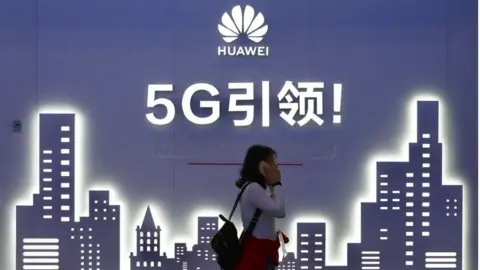Huawei launches new legal challenge against US ban
 Getty Images
Getty ImagesChinese telecoms giant Huawei has launched a legal challenge to a decision by US regulators to classify it as a national security threat.
It comes after the US Federal Communications Commission put curbs on rural mobile providers using a $8.5bn (£6.5bn) government fund to buy Huawei equipment.
The firm said evidence that it was a threat to security "does not exist".
The move is the latest in a series of challenges between Huawei and the US.
The company has asked the US Court of Appeal to overturn the decision.
Speaking at a news conference at Huawei's headquarters in Shenzhen, the company's chief legal officer, Song Liuping, said: "The US government has never presented real evidence to show that Huawei is a national security threat. That's because this evidence does not exist."
This is the second legal challenge this year by the company as it fights back against the Trump administration's policies.
Huawei launched similar legal action in May, challenging a decision to ban US government agencies from buying its equipment.
The company has been drawn into the disputes against the backdrop of the bitter trade war between the world's two biggest economies.
It has a leading role in manufacturing and selling key technology for next generation 5G telecoms infrastructure.
Meanwhile, Washington has been pressuring other nations to not allow Huawei to build their critical 5G telecoms infrastructure.
At the Nato summit in the UK on Wednesday, UK Prime Minister Boris Johnson said the decision on whether to allow Huawei a role in building Britain's 5G networks would be based on ensuring continued co-operation with the US over intelligence sharing.
"On Huawei and 5G, I don't want this country to be unnecessarily hostile to investment from overseas," Mr Johnson said.
"On the other hand, we cannot prejudice our vital national security. Nor can we prejudice our ability to co-operate with other vital... security partners - and that will be the key criteria that informs our decision about Huawei."
